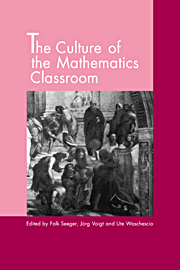Book contents
- Frontmatter
- Contents
- List of contributors
- Acknowledgments
- Introduction
- Part I Changing classroom culture
- 1 Joint activity in mathematics classrooms: A Vygotskian analysis
- 2 Evolution of classroom culture in mathematics, teacher education, and reflection on action
- 3 Reorganizing the motivational sphere of classroom culture: An activity-theoretical analysis of planning in a teacher team
- 4 The practice of teaching mathematics: Experimental conditions of change
- Part II Classroom processes
- Part III Epistemology and classroom culture
- Part IV Outlook
- Author index
- Subject index
2 - Evolution of classroom culture in mathematics, teacher education, and reflection on action
Published online by Cambridge University Press: 03 May 2010
- Frontmatter
- Contents
- List of contributors
- Acknowledgments
- Introduction
- Part I Changing classroom culture
- 1 Joint activity in mathematics classrooms: A Vygotskian analysis
- 2 Evolution of classroom culture in mathematics, teacher education, and reflection on action
- 3 Reorganizing the motivational sphere of classroom culture: An activity-theoretical analysis of planning in a teacher team
- 4 The practice of teaching mathematics: Experimental conditions of change
- Part II Classroom processes
- Part III Epistemology and classroom culture
- Part IV Outlook
- Author index
- Subject index
Summary
The projects implemented over the last 4 years within the framework provided by the CIRADE-associated research schools (CIRADE is the Centre Interdisciplinaire de recherche sur l'Apprentissage et le Développement en éducation at the Université du Québec à Montréal) are in keeping with a certain and, in my opinion necessary, relationship between research and teachers' professional development.
I shall concentrate on one collaborative research project that is currently being conducted in one of the schools mentioned. It involves elementary school teachers and a team of researchers at CIRADE in a process of reflection concerning their teaching practices. This project centers on the development of mathematical reasoning in young children and is based on a socioconstructivist approach to teaching. A set of actions was developed through which the participating teachers would be able to appropriate this approach.
This set of actions is patterned on the dynamic of reflective analysis described by Schön (1983, 1987) in The reflective practitioner that has provided abundant matter for reflection and comment within the sphere of teacher training in recent years. In essence, what is being proposed here is regular, planned alternation of in-class experimentation with the approach and group or subgroup reflection on this process. Emphasis is placed on establishing a shared process of reflection on action and interaction in mathematics classes.
Part of the project is currently investigating the process of appropriation through which teachers proceed. It is possible to retrace this through the following steps.
- Type
- Chapter
- Information
- The Culture of the Mathematics Classroom , pp. 50 - 75Publisher: Cambridge University PressPrint publication year: 1998



